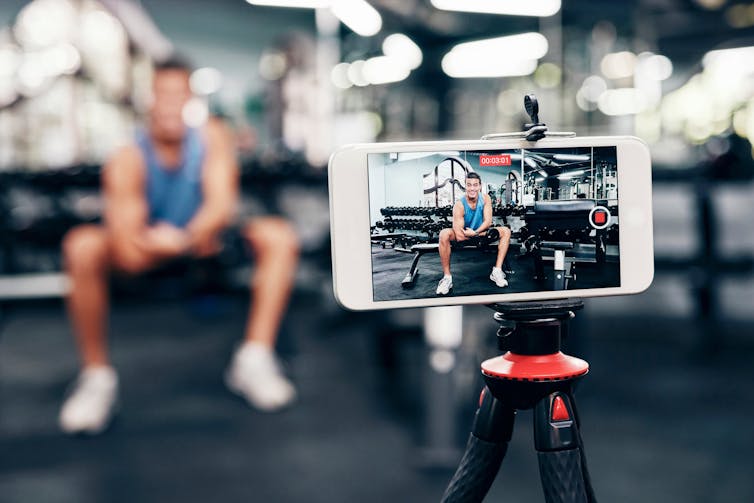YouTube is limiting recommendations of weight and fitness videos to teenagers – but more wide-ranging change is needed
- Written by Danielle Paddock, Research Associate in the Centre for Behavioural Science and Applied Psychology (CeBSAP), Sheffield Hallam University

YouTube is restricting[1] teenagers’ exposure[2] to fitness and weight-related videos to protect their wellbeing. This means that the platform’s algorithm will no longer make repeated recommendations of content that focuses on achieving specific fitness levels or body weights, or extols particular physical features.
This could include gym routines that involve pursuing a certain look, and videos that idealise beauty features – such as “how to get a chiselled jawline”. At the same time, Youtube is placing restrictions[3] on recommending content “displaying social aggression and intimidation” for under-18s.
But these changes do not stop teens searching for and viewing such content in the first place – and may not be enough to make a meaningful change.
Social media platforms are a fundamental part of youth culture. They hold the power to shape perceptions about appearance, health, fitness and lifestyle. Their vast repository of appearance-related videos can place great pressure on young people, bombarding them with all kinds of content that promotes unrealistic and often unachievable body standards.
The role of the algorithm
Research has found[4] that exposure to appearance-related content on social media is linked to increased body dissatisfaction and increased engagement in more restrictive eating behaviour.
Such content can be difficult to escape when algorithms are built to keep pushing it on users, even if young people are actively seeking more positive, less damaging content. It can create a situation where teenagers’ curiosity can quickly spiral into a dangerous obsession – with concerning consequences[5].
For a teenager who watches their favourite influencer’s “day at the gym” video, for instance, the algorithm will then deliver more and more fitness and weight-related content. From watching this one video, the algorithmic “rabbit hole” opens up. For young impressionable teenagers, this has the power to exacerbate harmful behaviour and consequences.
YouTube’s curb on recommending this content goes some way to mitigating the power of the algorithm. But even with restrictions in place, there is still a huge range of fitness, beauty and weight-related content available on the platform that may perpetuate harmful body standards. The YouTube restrictions also won’t stop teenagers from being bombarded with this same content on other apps.
Body image and social media
Body dissatisfaction among teens is linked to depression, anxiety and eating disorders[6]. Teenagers are at a critical developmental period where they are highly susceptible to social influences, so the content that they are exposed to on social media can heavily affect how they view themselves[7].
The rise of social media fitness and beauty influencers and all the videos about strict exercise routines, “what I eat in a day” videos and beauty routines has gone hand in hand. Teenagers feel pressure to conform to the body ideals portrayed in this content, but these “ideals” are often practically unattainable for most to achieve.
In reality, influencers often use a range of filters in their pictures and videos. These digitally altered images create a distorted view of appearance[9], contributing to increased body dissatisfaction for teenagers.
More needs to be done to address the larger societal issues that fuel body image concerns among teenagers. This starts with education.
If we give teenagers the knowledge and understanding about the way algorithms can affect what they see, and the risks associated with this, then they can feel a sense of empowerment and autonomy around their own safe social media use. Media literacy programmes have been found to improve body image among teenagers, equipping them with skills to critically engage with online content[10].
YouTube, along with other platforms, could take a more active role in promoting body diversity. This could include elevating videos that challenge traditional beauty standards[11]. The combination of powerful algorithms, societal pressures and the pervasive nature of social media means that a more holistic approach is necessary.
If we are to protect teenagers from poor body image and build greater online resilience, then it will require not only stricter algorithmic regulations. Media literacy, education and a cultural shift toward a body positive movement is needed.
References
- ^ YouTube is restricting (blog.youtube)
- ^ exposure (www.theguardian.com)
- ^ placing restrictions (www.youtube.com)
- ^ Research has found (doi.org)
- ^ concerning consequences (academic.oup.com)
- ^ eating disorders (www.sciencedirect.com)
- ^ view themselves (www.sciencedirect.com)
- ^ fizkes/Shutterstock (www.shutterstock.com)
- ^ distorted view of appearance (www.tandfonline.com)
- ^ online content (www.sciencedirect.com)
- ^ beauty standards (www.sciencedirect.com)







